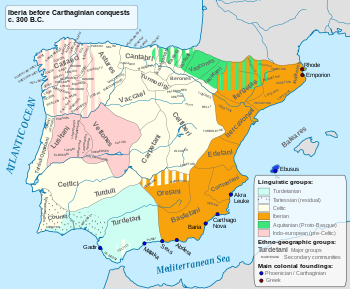Turduli

The Turduli (Greek Tourduloi) or Turtuli were an ancient pre-Roman people of the southwestern Iberian Peninsula.
Location
The Turduli tribes lived mainly in the south and centre of modern Portugal – in the east of the provinces of Beira Litoral, coastal Estremadura and Alentejo along the Guadiana valley, and in Extremadura and Andalusia in Spain. Their capital was the old oppidum of Ibolca (sometimes transliterated as Ipolka), known as Obulco in Roman times, and which currently corresponds to the city of Porcuna, currently located between the provinces of Córdoba and Jaén. Apart from Ibolca, the pre-Roman towns most strongly associated with the Turdulli include Budua (Badajoz), Dipo (Guadajira), Mirobriga (Capilla), and Sisapo (Almadén).
Origins
While they are sometimes described, in the available ancient sources, as being related ethnically to the neighboring
History
According to the 4th century BC
The collapse of Tartessos in around 530 BC,
See also
- Bardili (Turduli)
- Cynetes
- Tartessos
- Turdetani
- Turduli Oppidani
- Turduli Veteres
- Pre-Roman peoples of the Iberian Peninsula
Notes
- ^ "Historia e memorias da Academia R. Das Sciencias de Lisboa". 1825.
- ^ a b c Ferreira do Amaral, Povos Antigos em Portugal... (1992), pp. 66; 69; 112-113; 120-121; 124; 137; 162; 189.
- ^ Strabo, Geographikon, III, 1, 6.
- ^ Strabo. Geography. pp. Book III Chapter 2 verse 11.
- ISBN 978-1-84217-410-4.
- ^ Macrobius, Saturnalia, 1: 20, 25.
- ^ Herodotus, Istoriai, II, 33; IV, 49.
- ^ Ptolemy, Geographia, II, 5.
- ^ Pliny the Elder, Natural History, IV, 116-118.
- ^ Pliny the Elder, Natural History, IV, 21.
- ^ Pomponius Mela, De Chorographia, III, 1.
- ^ Strabo, Geographikon, III, 3, 5.
- ^ Pomponius Mela, De Chorographia, III, 8.
- ^ Pliny the Elder, Natural History, IV, 112-113.
References
- Jorge de Alarcão, O Domínio Romano em Portugal, Publicações Europa-América, Lisboa (1988) ISBN 972-1-02627-1
- Jorge de Alarcão et alii, De Ulisses a Viriato – O primeiro milénio a.C., Museu Nacional de Arqueologia, Instituto Português de Museus, Lisboa (1996) ISBN 972-8137-39-7
- Luis Berrocal-Rangel, Los pueblos célticos del soroeste de la Península Ibérica, Editorial Complutense, Madrid (1992) ISBN 84-7491-447-7
- Francisco Burillo Mozota, Los Celtíberos, etnias y estados, Crítica, Barcelona (1998, revised edition 2007) ISBN 84-7423-891-9
- João Ferreira do Amaral & Augusto Ferreira do Amaral, Povos Antigos em Portugal – paleontologia do território hoje Português, Quetzal Editores, Lisboa (1997) ISBN 972-564-224-4
- Alberto José Lorrio Alvarado, Los Celtíberos, Universidad Complutense de Madrid, Murcia (1997) ISBN 84-7908-335-2
- Ángel Montenegro et alii, Historia de España 2 - colonizaciones y formación de los pueblos prerromanos (1200-218 a.C), Editorial Gredos, Madrid (1989) ISBN 84-249-1386-8
